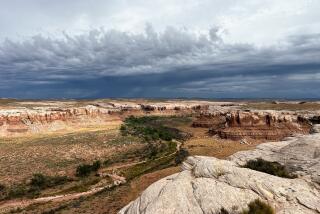Civil War Site Battling Developers
MANASSAS, Va. — Five years after Walt Disney Co. canceled plans to build a $650-million theme park near the site of the battles of Bull Run, urban sprawl may pose an even greater threat to the region’s Civil War sites.
Developers in northern Virginia, driven by the area’s booming economy, have chewed up land at a frantic pace with condominiums, subdivisions and strip malls.
“It’s like being nibbled to death by ducks,” said Kat Imhoff, executive director of the Preservation Alliance of Virginia. “You don’t even realize the quantity of resources we’re losing because it’s so piecemeal.”
In 1994, Disney pulled the plug on plans to build an American history theme park four miles from Manassas National Battlefield Park, where the Confederate and Union armies engaged in the first full-scale battle of the Civil War in 1861.
Fighting Disney was tough, but tracking the seemingly endless local development proposals may be even more difficult, said Elliott Gruber, executive vice president of the Civil War Trust, the country’s largest Civil War battlefield preservation group.
“The threats just continue to expand,” he said.
Robert Sutton, superintendent of the Manassas park, spends hours at zoning and planning board meetings fighting proposals for hotels or strip malls that would ruin the views from the battlefield. A strip mall was built last year on the park’s southern boundary.
“As more of the region is built up, there will be even more pressure” to develop around the park, Sutton said.
Jim Lighthizer of the trust says an acre of Civil War battlefield is lost somewhere in the United States every 10 minutes. With that in mind, Interior Secretary Bruce Babbitt and others are urging Congress to dedicate permanent funding to buy historic lands and open spaces.
When Disney announced in 1993 that it wanted to build a 3,000-acre park in tiny Haymarket, 35 miles southwest of Washington, the plan ignited a national debate over urban sprawl and historic preservation.
Eighteen Civil War battlefields, 14 historic towns or villages and 60 sites on the National Register of Historic Places were within a half-hour drive of the Disney site. While the project had the support of many elected officials, citizens soured on it when they envisioned the traffic, hotels, gas stations, convenience stores and fast-food restaurants that would accompany the park.
The Disney proposal served as a national referendum on urban sprawl, said Richard Moe, president of the National Trust for Historic Preservation.
“Disney was a watershed event,” he said. “There was nothing historic on that property, but the collateral development that would have sprouted in all directions would have overwhelmed the fragile battlefields and the beautiful landscape.”
Urban sprawl is now considered such a threat to quality of life that Vice President Al Gore has made it a theme in his campaign for the Democratic presidential nomination.
The Disney proposal taught preservationists and environmentalists that they had to work more closely together. Although preserving history is not the mandate of environmental groups, by protecting battlefields they are preventing sprawl and its associated pollution and loss of open space.
“Historic preservation groups have become more concerned about road projects and local zoning than ever before,” said Trip Pollard of the Southern Environmental Law Center, who also serves on the board of the Historic Preservation Alliance of Virginia.
But not everyone agrees that battlefields should be set aside.
The federal government’s purchase of land for historic preservation costs jobs and prevents landowners from fully profiting from their properties, said Carl Grenn, past president of the Civil War Roundtable of Fredericksburg.
“Who is willing to give up a job because his place of employment may be near land once part of the fighting during the Civil War?” Grenn wrote in a letter published in the Free Lance-Star of Fredericksburg.
More to Read
Sign up for Essential California
The most important California stories and recommendations in your inbox every morning.
You may occasionally receive promotional content from the Los Angeles Times.









